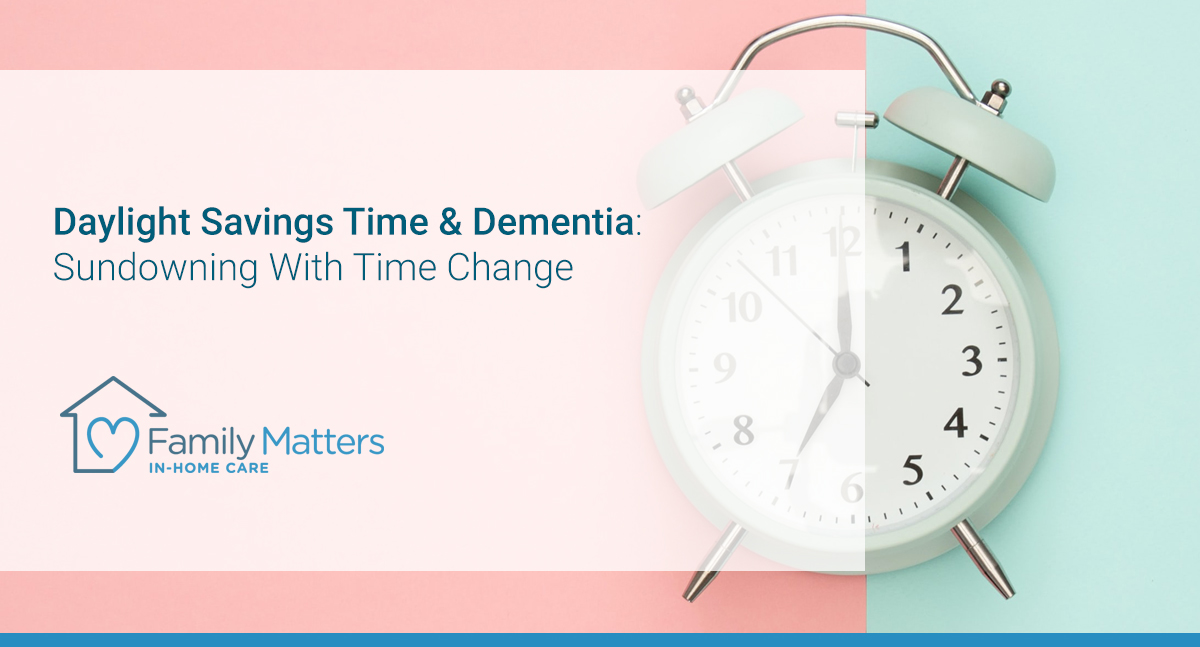
Daylight Savings Time & Dementia: Sundowning With Time Change
If you have not been directly impacted by Alzheimer’s disease or other forms of dementia, Daylight Saving Time may mean nothing more than a temporary disruption in your sleeping pattern.
However, for people living with dementia and their family members or professional care providers, changing the clock can accelerate a type of disorientation known as “sundowning.”
With the prolonged hours of darkness prompted by the end of Daylight Saving Time, dementia and behavioral changes can make life even more challenging in the weeks to come.
Daylight Saving Time, Dementia, and Sundowning
The term “sundowning” is used to describe a group of daily symptoms that may occur in people living with dementia. Not all dementia patients develop sundowning. The Alzheimer’s Association estimates that approximately 20% of Alzheimer’s patients also suffer from sundowning.
Symptoms may include:
- Sadness
- Restlessness
- Anxiety
- Delusions
- Increased confusion
- Hallucinations
- Erratic mood swings
- Surges of energy
With sundowning, these symptoms begin to emerge in the late afternoon or early evening as the sun goes down. Experts believe symptoms may be associated with a disruption in sleep cycles.
Those with a healthy balance of brain chemicals can easily shake off the intrusion on their circadian rhythms. A few sleepy mornings and an extra cup of coffee are often all it takes to readjust to the time change.
However, Alzheimer’s patients who are already struggling to understand concepts of time may feel confused when it is dark before dinnertime or agitated when they become tired so early in the evening.
While the Daylight Saving Time change itself does not cause sundowning symptoms, the added hour of darkness disrupts sleep/wake patterns and can make all dementia symptoms worse. This can cause frustration and fear both for the patient and those who care for them.
Tips for Managing Daylight Saving Time Dementia Effects
Living with Alzheimer’s disease or someone who has Alzheimer’s disease brings both new challenges and new joys to life. The addition of sundowning symptoms may increase the challenges, but they can be managed with some effort.
These tips will help caregivers, family members, and patients minimize the effects of sundowning and improve the quality of life for everyone involved:
- Schedule activities and appointments in the morning or early afternoon
- Take notes about the sundowning behaviors to identify avoidable triggers
- Limit intake of caffeine and sugar to the morning or early afternoon
- Reduce stimulation in the evening —turn off the television or music and avoid busying yourself with chores
- Eat a larger lunch and a lighter evening meal
- Keep to your normal daily routine as much as possible
- Get appropriate amounts of exercise during the day (to expend restless energy and prepare the person for an earlier bedtime)
- Talk to the person’s doctor about changing medication times if needed
- Never attempt to restrain the person — it will only increase their agitation
- Limit daytime napping
- Keep your home well-lit in the early evening to help reduce confusion about the time change
- Allow the person to pace or perform other restless activities as long as they are not harmful
If you are a caregiver to someone with dementia, make sure you get adequate amounts of rest, exercise, and good nutrition to lower your own stress levels.
People with Alzheimer’s disease often have an increased sense of emotional radar. They can pick up on the feelings of others and react similarly. Your feelings of stress and anxiety can have a negative impact on the behavior of your loved one.
Caregivers are often reminded of the importance of self-care but frequently ignore their own needs because they feel it is “selfish” to take time for themselves when their loved one needs help. The truth is, the stronger you are emotionally and physically the better care provider you will be.
Rule Out Other Problems
When someone is living with dementia, it’s easy to assume any new symptoms are dementia-related. You or your family member may be experiencing accelerated symptoms of sundowning due to the time change, but certain medical conditions, such as a urinary tract infection, can also cause agitation, stress, and confused behaviors.
Make sure to have a thorough medical screening to rule out any medical cause for new or worsening sundowning symptoms.
If you or your family member is considering in-home care as part of a plan to age in place, contact Family Matters In-Home Care today for a free consultation. Our team is dedicated to supporting your family and helping older adults enjoy life in the comfort of their own home for as long as possible.
Some of the services offered by Family Matter In-Home Care include: Alzheimer’s & Dementia Care, Bed & Wheelchair Transfer Assistance, Companionship, Housekeeping & Meal Preparation, Personal Care, Recovery Care, and Transportation.
Serving the San Francisco Bay Area and Greater San Diego, Family Matter In-Home Care has offices throughout California including: Campbell, CA, Roseville, CA, San Marcos, CA, and San Mateo, CA.
